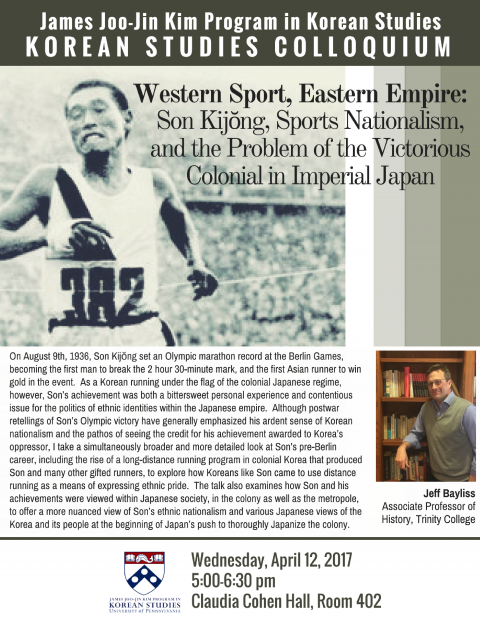
Korean Studies Colloquium
Claudia Cohen Hall, Room 402
On August 9th, 1936, Son Kijŏng set an Olympic marathon record at the Berlin Games, becoming the first man to break the 2 hour 30-minute mark, and the first Asian runner to win gold in the event. As a Korean running under the flag of the colonial Japanese regime, however, Son’s achievement was both a bittersweet personal experience and contentious issue for the politics of ethnic identities within the Japanese empire. Although postwar retellings of Son’s Olympic victory have generally emphasized his ardent sense of Korean nationalism and the pathos of seeing the credit for his achievement awarded to Korea’s oppressor, I take a simultaneously broader and more detailed look at Son’s pre-Berlin career, including the rise of a long-distance running program in colonial Korea that produced Son and many other gifted runners, to explore how Koreans like Son came to use distance running as a means of expressing ethnic pride. The talk also examines how Son and his achievements were viewed within Japanese society, in the colony as well as the metropole, to offer a more nuanced view of Son’s ethnic nationalism and various Japanese views of the Korea and its people at the beginning of Japan’s push to thoroughly Japanize the colony.
Jeff Bayliss is Associate Professor of History at Trinity College in Hartford, Connecticut. His research focuses on minority populations, issues of ethnic identity, and identity politics in pre- and postwar Japan. He is the author of On the Margins of Empire: Buraku and Korean Identity in Prewar and Wartime Japan (Harvard East Asian Monographs, 2013).
 James Joo-Jin Kim Center for Korean Studies
James Joo-Jin Kim Center for Korean Studies